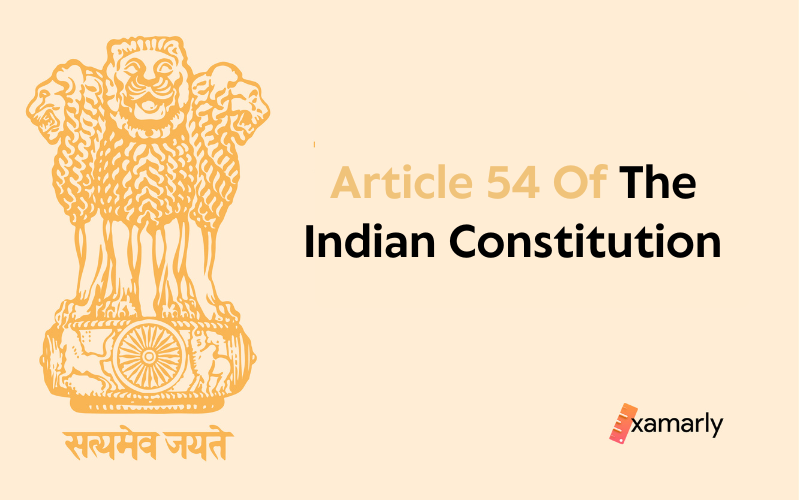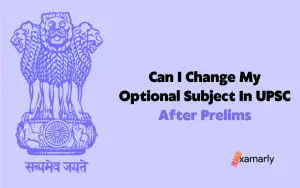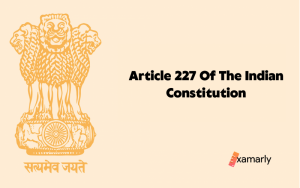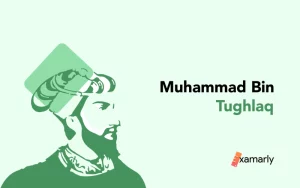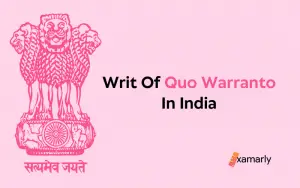The special provisions of Article 54 of the Indian Constitution deal with the election of India’s President. Despite not having the authority to be detained or locked up, the President is the official leader of the executive powers. He follows the Ministerial Council of Advisors’ recommendations.
The following article highlights the major details and connections regarding Article 54.
- What Is Article 54 Of The Indian Constitution?
- Election Of President
- The House Of Parliament Of India
- Qualifications Required For The President Of India
- Conclusion
- FAQs
- What Is Stated In Article 54 Of The Indian Constitution?
- Is Article 54 Of The Constitution Related To President Elections?
- What Electoral System Is Used For The Election Of The President?
- Who Elects India's President?
- How Long Will The President Be In Office?
- When Is India's Presidential Election Held?
- Who Organizes The Election For India's Presidency?
- What Is The Process Of President Impeachment?
What Is Article 54 Of The Indian Constitution?
The President shall be elected by the members of an electoral college consisting of –
- (a) members of both Houses of Parliament who are elected; and
- (b) the elected representatives in the state legislatures.
Election Of President
The Electoral College of India consists of elected members of both houses of Parliament and Legislative Assemblies from all States and Union Territories. It also has a member from the NCT of Delhi. The House of People comprises 530 members, each based on a particular skill or expertise. The Constitution also has a special process for enacting language laws.
The House Of Parliament Of India
Our nation has a bicameral system of government, which means that there are two houses for legislative purposes. At the federal level, our legislative assemblies of states are bicameral, while state legislatures can be either unicameral or bicameral matters. While some states also have a bicameral form, the majority of states have unicameral systems. Let’s look at the Parliament’s two houses at the central level. The following is a list of the two houses of parliament:
One of India’s two houses, Rajya Sabha is also referred to as the country’s upper house. The Rajya Sabha is not referenced in the Indian Constitution. Because it describes the nation’s states and Union territories, our Constitution refers to it as the council of States. Because it cannot be disbanded, unlike the Lok Sabha, it is often known as the permanent house of the Parliament. On a rotating basis, one-third of its members leave after every two years. Each member is chosen to serve a term of six years. It is referred to as the upper house.
As stated in the Indian Constitution, Lok Sabha is referred to as the House of People. It is regarded as the lower house as well. Through elections, the country’s population chooses the members. The political party that receives the most votes and seats wins the election and takes power for a five-year term. The Constitution allows for a maximum strength of 552. The speaker, who is typically selected from the ruling party, serves as the chairperson of this house.
Relatable Articles: Check out the linked articles from the table given below for effective UPSC preparation of Indian Polity.
Qualifications Required For The President Of India
The applicant for the position of President must be an Indian national as qualifications for election. To be qualified for election as a Lok Sabha member, he or she must be of 35 years at least. The selection of the President is not open to anyone who currently holds a position of yield beneath the control of the Government of India, the Government of any State, or any other authority.
Conclusion
Article 54 of the Constitution of India is outlined in Part V of the constitution. This article states that the President shall be chosen by components of an electoral college made up of selected components of both Houses of Parliament as well as elected representatives from state legislatures.
FAQs
What Is Stated In Article 54 Of The Indian Constitution?
Article 54 states that the President shall be selected by the associates of an electoral college consisting of –
(a) components of both Houses of Parliament who are elected; and
(b) the elected representatives in the state legislatures.
Is Article 54 Of The Constitution Related To President Elections?
Yes, it is related to the election of the President. According to Article 54 of the Constitution, Electoral College members chose the Indian President. The electoral college comprises the elected members of both houses of Parliament, the Legislative Assemblies of States, the Union Territory of Puducherry, and the National Capital Territory of Delhi.
What Electoral System Is Used For The Election Of The President?
A single transferable vote will be used to elect the president, and voting will take place in a secret ballot process in accordance with the proportional representation system.
Who Elects India’s President?
According to the Election Commission of India, the President is chosen by the associates of an electoral college that includes elected representatives from the Lok Sabha (House of the People), the Rajya Sabha (Council of States), the Legislative Assemblies of the States, and the Union Territories of Delhi and Puducherry.
How Long Will The President Be In Office?
The President’s tenure in office begins on the day he assumes office and lasts for five years. But until his successor assumes office, he will continue to serve in that capacity despite the end of his term.
When Is India’s Presidential Election Held?
The Election Commission may make the presidential election announcement on any day up to sixty days before the incumbent president’s term in office, in line with subsection (3) of Section 4 of the Presidential and Vice-Presidential Elections Act of 1952. It is necessary to arrange the election calendar so that the new President can take office on the day after the current President’s term expires.
Who Organizes The Election For India’s Presidency?
The Election Commission of India is given the power to hold presidential elections beneath Article 324 of the Indian Constitution.
What Is The Process Of President Impeachment?
The Quasi-Judicial Procedure is used to impeach the president of India.


